

Instructional Methods. Instructional Design Methods & Models. Instructional Design. Learning Design - The Project. Following: An example, How to construct a sequence, An early version. SMAR Model. 6 characteristics of great PD (and great classrooms) 1.

Constructivist The best PD workshops are constructivist, or marked by experiential learning. In these workshops participants are actively discovering the features, properties, and potential of a tool, app and a device. What makes for effective PLD? At a meeting I attended last week a group of people were discussing approaches they might use to 'bring teachers up to speed' with the ideas and approaches they were discussing (in this case, computational thinking).
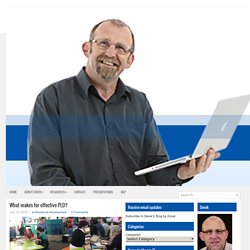
The discussion that ensued raised all of the usual issues around why it's difficult to find effective PLD solutions: teachers are time poor, the overloaded curriculum, lack of expertise, reluctance to change etc. When turning their attention to finding a solution the predictable list appeared: provide more teacher only days (TODs), introduce a range of incentives (carrots), introduce mandatory requirements (sticks) etc.
The discussion also ventured into the problem with providing PLD support that is 'just in time' rather than that which is 'just in case'. Adult Learning Theory and Principles. Become familiar with Adult Learning Theory and the six principles of adult learning Adult Learning Theory Part of being an effective educator involves understanding how adults learn best (Lieb,1991).
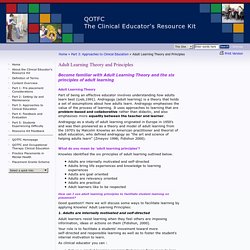
How to Use Flipcharts. Techniques > Public speaking > Speaking Tips > How to Use Flipcharts Preparation | Writing | Drawing | On the wall | General use | See also Using a flipchart during a presentation or training session can be a very successful tool or can go horribly wrong.
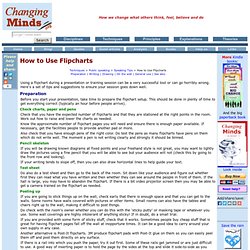
Here's a set of tips and suggestions to ensure your session goes down well. Preparation Before you start your presentation, take time to prepare the flipchart setup. Infographic: New Managers Not Getting the Training They Need to Succeed. In a recent survey conducted by The Ken Blanchard Companies, more than 400 managers were asked to rate different types of training by order of importance.
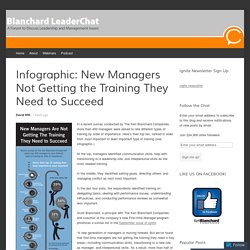
Here’s their top ten, ranked in order from most important to least important type of training (see infographic.) At the top, managers identified communication skills, help with transitioning to a leadership role, and interpersonal skills as the most needed training. Free professional development exercises and activities. What are Interpersonal Skills? Interpersonal skills are the life skills we use every day to communicate and interact with other people, both individually and in groups.
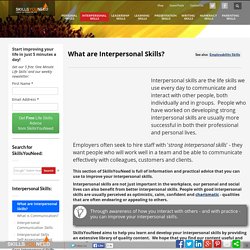
People who have worked on developing strong interpersonal skills are usually more successful in both their professional and personal lives. Employers often seek to hire staff with 'strong interpersonal skills' - they want people who will work well in a team and be able to communicate effectively with colleagues, customers and clients. This section of SkillsYouNeed is full of information and practical advice that you can use to improve your interpersonal skills. Interpersonal skills are not just important in the workplace, our personal and social lives can also benefit from better interpersonal skills. Collaboration exercises with Dundu. Instructional Design And The Six Thinking Hats. FACILITATION TOOLS. Draw Toast. Index to Group Activities, Games, Exercises & Initiatives.
Team Building Activities, Initiative Games & Problem Solving Exercises. Team Building Activities, Initiative Games & Problem Solving Exercises. Toolkits. Donald Schon (Schön) - learning, reflection and change. Hase-Kenyon_full.pdf. The Sourcebook for Self-directed Learning. Interesting Chart Outlining the Differences between Pedagogy, Andragogy, and Heutagogy. Preparing our kids and students for a global knowledge economy necessitates a new teaching approach; one that will equip them with the skills and competencies needed to thrive in such an economy.
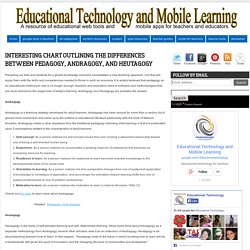
It is widely believed that pedagogy as an educational method per see is no longer enough; teachers and educators need to embrace new methodologies that are more relevant to the exigencies of today's learning. Andragogy and Heutagogy are probably the answer. Andragogy Andragogy is a teaching strategy developed for adult learners. Tip 114 - Audio QR Codes. Imagine students’ artwork hanging in your school’s hallway and beside each masterpiece is a QR code.
When parents, students, and other teachers scan the code using a mobile device, they hear the student telling about themselves and the relevance of their art... Or what about a QR code in the back of a library book that allows you to hear a student’s review of the book? QR Codes – What are they and how can I use them in my classroom? A QR Code is a type of barcode that is readable by dedicated QR barcode readers and camera telephones. The code consists of black modules arranged in a square pattern on a white background. The information encoded may be text, URL, or other data*. Like me, you may have seen these codes in newspapers and magazines, on promotional material, in the corner of posters and wondered what they were all about. 10+ Ideas for Using Mobile Devices Offline to Motivate Learners. Mobile Learning: 50+ Resources & Tips. I believe mobile devices will transform education. This is why I created a free ebook, Effective Mobile Learning: 50+ Quick Tips & Resources with helpful tips and several resources to help support this trend.
One reason is because mobile devices are designed in a way that forces the teacher to give control to the learner. Mobile Learning: 50+ Resources & Tips. Learning theory - models, product and process. Photo by Antenna on Unsplash.
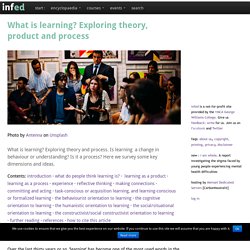
Chris argyris, double-loop learning and organizational learning @ the encyclopedia of informal education. Contents: introduction · life · theories of action: theory in use and espoused theory · single-loop and double-loop learning · model I and model II · organizational learning · conclusion · further reading and references · links · cite Chris Argyris has made a significant contribution to the development of our appreciation of organizational learning, and, almost in passing, deepened our understanding of experiential learning.
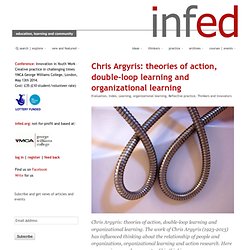
On this page we examine the significance of the models he developed with Donald Schön of single-loop and double-loop learning, and how these translate into contrasting models of organizational learning systems. Life Chris Argyris was born in Newark, New Jersey on July 16, 1923 and grew up in Irvington, New Jersey. During the Second World War he joined the Signal Corps in the U.S. Programming Your Brain: The Art of Learning in Three Steps. From time to time, I run into people who are interested in breaking into programming.
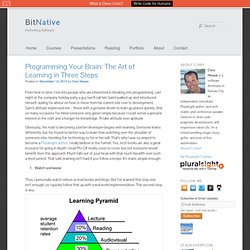
Last night at the company holiday party a guy (we’ll call him Sam) walked up and introduced himself, asking for advice on how to move from his current role over to development. Sam’s attitude impressed me – those with a genuine desire to learn go places quickly. And on many occasions I’ve hired someone very green simply because I could sense a genuine interest in the craft and a hunger for knowledge.
I’ll take attitude over aptitude. Learning Techniques. One of the things that we expect you to pick up by osmosis, but almost never mention explicitly, is techniques for learning itself. After you leave university, you will be expected to be able to learn by yourself for the rest of your life. Learn with QR Codes. How to use Gagne's model of instructional design in teaching psychomotor skills. How to Find Anything Online: Become an Internet Research Expert.
Einstein once said, “The secret to creativity is knowing how to hide your sources.” The same could be said of intelligence. What they don’t tell you is that the “smart” people of the world are, in most cases, just better at researching and learning things than everyone else. But researching is a learned skill, not something you’re born with. Overview of learning styles. Free QR Code Generator, Coupon, Contact & Design QR Codes & Tracking. The Top 20 Leadership Thinkers of 2015. As the year draws to a close, it is time to look at those people who have influenced our thinking.
Over the next few weeks, I will be posting various lists about trends and influencers covering various topics. In this post, however, we will be looking at ‘The top 20 Leadership thinkers of 2015’ these are considered to be the world’s top leadership and management thinkers. Since 2001, Thinkers50 have published their ranking of the top leadership and management thinkers and they do this every other year. This is now becoming the equivalent of the ‘Oscars’ in the leadership and management community. Body language. Techniques for Changing Minds. From Andragogy to Heutagogy. Author: Stewart Hase and Chris Kenyon (2001) Southern Cross University Keywords: Southern Cross University, pedagogy, andragogy, heutagogy, higher education, vocational education, self-determined learning.
Rethinking Thinking - Does Bloom's Taxonomy Align with Brain Science? Dr. International Centre for Educators' Learning Styles. Ten Tips for New Trainers/Teachers. « I know something you don't | Main | Every user is new and different... » Ten Tips for New Trainers/Teachers Just because you've used lots of software doesn't mean you can write code.
Just because you've been in lots of buildings doesn't mean you can be an architect.
Train The Trainer Power Point Presentation.